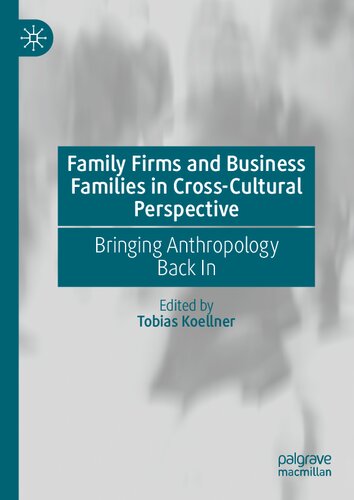دانلود کتاب Family Firms and Business Families in Cross-Cultural Perspective: Bringing Anthropology Back In - Original PDF
Author:
Tobias Koellner
0 (0)
توضیحات کتاب :
IntroductIon Although the topics of kinship and economy are central to anthropologi- cal analysis, few scholars have brought the two fields together by introduc- ing broader concepts or large-scale comparisons. To date, the topic is gaining importance (Hann, 2018), and there is some solid research available; however, the results remain disparate and have few links to each other. Therefore, family business researchers with a strong background in management studies currently dominate the analysis of family firms and business families. A better understanding of family business, however, remains both necessary and hard to achieve under these research trajecto- ries. Therefore, the main aim of this volume is to provide a vision of how family business research and anthropology can be brought together, in order to benefit future research in both disciplines and develop a more sophisticated understanding of family businesses themselves. The study of family business has insisted that family ownership and operation distinguishes this business form from others such as non-family corporations, because of the close interaction between kinship and busi- ness interests. Such an insistence naturally demands further specification of how the family matters, and family business research has attempted to clarify the influence of the family itself on business activities by developing concepts such as familiness (Frank et al., 2010; Habbershon & Williams, 1999; Zellweger et al., 2010), entrepreneurial legacy (Jaskiewicz et al., 2015) or socio-emotional wealth (Gómez-Mejía et al., 2007). As a result, the kinship group behind the family firm has received increasing attention in family business research in the last decade or so (Caspary, 2018; Combs et al., 2020; Jaskiewicz et al., 2017, 2020; Kleve et al., 2020; Kleve & Koellner, 2019; Koellner et al., 2022; Stamm, 2013). Nevertheless, it still is the case that some obstacles to a better under- standing of the kinship group behind the family firm remain. A first con- sideration about the direction of future research concerns the fact that family business research largely focuses its analysis on single persons and not on broader networks of kin or whole families (Jaskiewicz et al., 2017: 313). Therefore, the composition, structure and organization of the kin- ship group still remain largely neglected, as do the form and quality of these relationships (Kushins & Behounek, 2020). Here anthropology definitely can offer some insights with its detailed ethnographies on kin relations based on long-term research
سرچ در وردکت | سرچ در گودریدز | سرچ در اب بوکز | سرچ در آمازون | سرچ در گوگل بوک
1,175 بازدید 0 خرید










